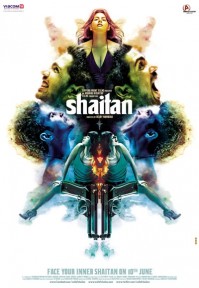Hindi cinema has changed and not just for the protagonists who inhabit it but for those who are recreating it. There is an obvious urge to reinvent cinematic language. Well and good but the ironical thing is that every maverick filmmaker (Kashyap now. RGV in the past) who sets out to change and muss things around becomes repetitive too and self-derivative. Look at Shaitan. It is obviously inspired from Kashyap’s unreleased Paanch. The story here too is about five friends on their way to hell littered with random victims. There are the long chase sequences inspired by Kashyap’s Black Friday (his most perfect film to date). Even though Nambiar is by and large his own man as far narrative style goes, he obviously is one of those young filmmakers who think it is cooler to be influenced by a Tarantino or a Kashyap than a Yash Chopra.
The orchestration of violence, especially in the Khoya Khoya Chand sequence is very Tarantino. And yes, any resemblance to I Know What You Did Last Summer, Khel Khel Mein and Khiladi is incidental. There is the same sense of heady, dangerous purposelessness in the key moments of the film as when a few young, drunk friends in Saturday Night Fever start daring each other to walk on the Verrazano Narrows Bridge though here the tragedy grows from being accidental to purposefully evil. You are reminded of the bored rich in Fitzgerald’s The Great Gatsby who run over lives and leave the mess for others to clean.
Kalki Koechlin’s Amy is a difficult daughter labouring under a dysfunctional childhood and finds some validation in a group of no gooders who have no ambition, sense of purpose except to go from day to day, seeking new drugs, real, virtual and psychological. Amy is at first the innocent recruit but empowered by the others in the group, she becomes more and more wilful and increasingly disruptive.
She combines her patented wide-eyed sunshine and baby pout with a horrific though overplayed background story. That story should have come full circle when we see her after a bloody aftermath, headphones on, as impervious to grief or guilt as an ice-cube. But her story goes on till the last frame and even though the other four characters have important roles, we never learn why they are the way they are.
Especially Gulshan Devaiah’s mercurial Karan Chaudhary or KC who is high on drugs, life, sex, a speeding Hummer and violence. Devaiah is the keynote of the film and his self-absorption is frighteningly palpable as he seeks out women, thrills, danger and a sense of escape till it all comes to a painful conclusion in a church; a space usually associated in Hindi films with redemption and peace.
 Dash or Dushyant Sahu is played by a surprisingly layered Shiv Pandit (He likes to whip himself, is loyal to friends but can grow hurtful and violent if pushed too far) but he too is a one note character and deserved to be detailed further.
Dash or Dushyant Sahu is played by a surprisingly layered Shiv Pandit (He likes to whip himself, is loyal to friends but can grow hurtful and violent if pushed too far) but he too is a one note character and deserved to be detailed further.
Kirti Kulhari is Tanya, an overworked, bulimic model, a confused mix of middle-class reticence and aspirations, who bonds with people who have more than her. Neil Bhoopalam plays Zubin, a guy who veers between obnoxiousness and one-sided, wistful love. The actors work well but we never learn why this bunch is so cold to common sense and basic human decency.
Throwing a balloon full of urine at a Holi crowd may be someone’s idea of fun but hurting others first accidentally and then intentionally is just an inexplicable descent into a dark space where no one is a friend and murder is an impulse and as simple is eating anda bhurji at a roadside stall. What the film does effectively is to treat Mumbai as a metaphor of colliding opposites. We see how the rich and the careless live and then we see bylanes and hovels and the bloody seams of crime and violence joining the two worlds together.
The deep rooted corruption in every crevice of the law enforcement machinery is driven home when a cop played with convincing rottenness by Raj Kumar Yadav negotiates a bribe of 25 lakh over a few slaps, cuss words and the memory of two dead people. The ennui in government offices come alive when a hilariously insensitive clerk fills up a divorce form with asides like, “Toh shaadi ek saal bhi nahin chali?”
The most disturbing part in Shaitan for me as it was in Dev D, is the disregard with which a hit and run accident is dismissed and its victims forgotten by the narrative. Here too the focus shifts from two random accident victims to a kidnapping of a rich NRI girl. There is also a sense of joviality in a kidnapping flashback that you laugh at till you realise how devious and amoral it is.
Don’t look for a moral centre here except in Rajeev Khandelwal who is one of the best things to have happened to us because he is a star you watch while he acts like he means it. Though it is time he did a role that did not require him to inhabit Mumbai’s darkest stories.
To make up for the absence of humanity and innocence, we have an unpredictable and refreshing ensemble cast popping out of the story to engage us. Great to also to hear the gifted Ranjit Barot doing something substantial for a major film after the long forgotten Oh Darling Yeh Hai India. Bejoy Nambiar is undoubtedly an exciting new talent and Shaitan is not a bad film. It is smart, witty, irreverent but also cocky and drunk on its own adrenaline and the only relevant ‘message’ you get from it is when Anurag Kashyap comes in the beginning and exhorts you to get high on life. Not on drugs. Thank you Mr Kashyap, good to know you care.
Reema Moudgil is the author of Perfect Eight (http://www.flipkart.com/b/books/perfect-eight-reema-moudgil-book-9380032870?affid=unboxedwri )








no comments as i havn’t seen this movie yet but i can say that purposelessness and irreverence have a great attraction in youths today and a film maker will produce whatever that sells. He is not concerned our concepts and prejudice.